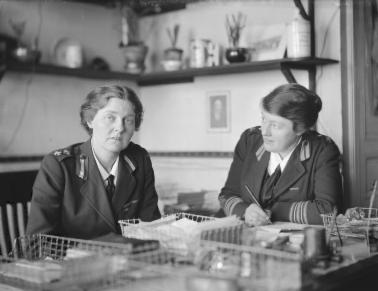PROBLEMS
*****

FOUNDATION OF THE PRESENT DIFFICULTIES IN V.A.D. SERVICE (1917)
1. The Trades Union feeling among trained nurses involving jealousy of the untrained women. There are, of course, hundreds of exceptions.2. Instinctive repudiation in official circles and resentment of any criticism or even suggestion of room for improvement in Military Formations.
3. ‘Discipline’ misinterpreted by ‘Bullying.’
4. That the dregs of the Nursing Profession are now being used owing to insufficiency of the best type of Trained Nurses. The result is that you get very inferior women put in charge posts while you have highly educated cultured women serving as V.A.D. members.
5. V.A.D. work being a Blind Alley and leading to nothing. ‘Once a V.A.D. always a V.A.D.’
6. The cantankerous spirit pervading some hospitals makes our members swear that once the War is over they will never enter a hospital again. Even though they are devoted to the work. This must necessarily react on the future efficiency of the Nursing Profession, which by encouraging V.A.D. members now would have a very good source of supply in the future.
7. This spirit is usually due to the general influence. A Matron can inspire her whole staff in one direction or another.
8. The present methods of training schools tend to kill individuality and to dwarf all interest in things outside the Profession. The result is a general narrowing of expansion of the woman’s mind.
9. What used to be a Profession of Devotion is now very often a money seeking profession so far as private nurses are concerned. The result is that the Private Nurses who have joined the Army Services dread the competition of the ‘Untrained,’ and in many cases put their own interests in front of the good of the Sick and Wounded and snub and discourage the V.A.D. member till they drive her out of the Service.
10. Inequality in the Service. In one hospital the V.A.D.s may be trusted with very responsible work, if for any reason they transfer to another hospital they may find themselves put back to the most menial duties. This is very discouraging and accounts for the large numbers of resignations.
11. The appointment of Fever trained nurses as ‘Assistant Nurses.’ They rank higher than the V.A.D. members who may have had 2 years of surgical work. If fewer nurse were used for fever or medical work only the case would be different.
DEVONSHIRE HOUSE COMPLAINTS
That we practically act as a Registry Office so far as Military and Auxiliary Hospitals are concerned. We have no power to ensure proper conditions or proper welfare or proper control of V.A.D. members in any of these formations. The public probably hold us responsible but we can do nothing except forward complaints which are usually received in the wrong spirit. The result is that our members often feel that we take no interest in them.
The Matron-in-Chief resents complaints and takes them up in such a way with the Hospitals that the V.A.D.s would often sooner resign than complain.
The result is that there is very serious wastage of useful material from the Country’s point of view. This can be ill spared when there is a real shortage of the right type of trained nurse. The only cure is to give the V.A.D. Organisation (V.A.D. Women Officers) more power to look after their members and to insist that the Matrons all treat the V.A.D.s equally and that bullying Sisters and Nurses are very severely dealt with.
The Fetish of three years’ training might well form the subject of an enquiry.
(Source: IWM Women's Work Collection/British Red Cross Society)
*****